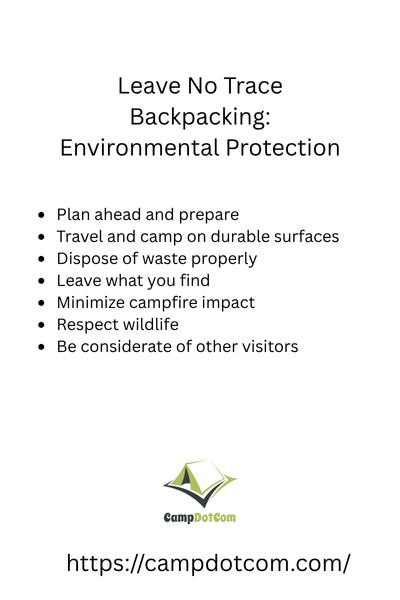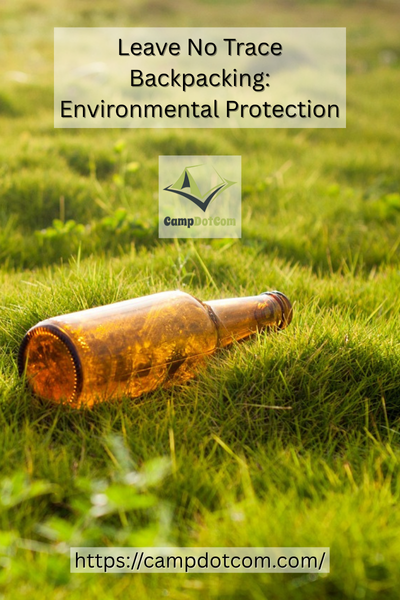Try to Picture this; you’re hiking through a breathtaking forest, the air is crisp, and the only sounds are the rustling leaves and a distant bird call. It feels untouched, pristine—just as nature should be. Now, imagine coming back a year later only to find plastic wrappers, scorched tree roots, and a trail widened by careless footsteps. Heartbreaking, right? That’s why leave no trace backpacking is so important.
It’s not just about taking a great trip; it’s about ensuring the next adventurer—and the one after that—gets to experience the same unspoiled beauty.
Read More About Leave No Trace Backpacking

What is Leave No Trace Backpacking?
At its core, leave no trace backpacking is all about respecting nature and minimizing our impact when we’re out in the wild. It’s a simple concept: take only memories, leave only footprints (but even those should be on designated trails).
As an Amazon Associate, I earn from qualifying purchases. Some of the links in this article are affiliate links. This means that, at zero cost to you, I will earn an affiliate commission if you click through the link and finalize a purchase.
More Things to Know About Leave No Trace Backpacking

I remember my first big backpacking trip in the Rockies. I was eager, excited, and, to be honest, a bit clueless. I packed way too much, set up my tent a little too close to a stream, and didn’t think twice about tossing an apple core into the woods. “It’s biodegradable!” I thought.
Rookie mistake. Turns out, even organic waste can disrupt local ecosystems. Lesson learned.
The Seven Principles of Leave No Trace
To make Leave No Trace backpacking easy to follow, the experts have boiled it down to seven simple principles. Stick to these, and you’ll be doing your part to protect our wild spaces.
1. Plan Ahead and Prepare
Ever been caught in the rain with no dry socks? It’s miserable. But beyond comfort, poor planning can lead to environmental damage. When people get lost or unprepared, they’re more likely to cut across fragile terrain or leave gear behind. Check maps, know regulations, and pack wisely.
2. Travel and Camp on Durable Surfaces
Think of nature like your grandma’s fancy carpet—would she want you stomping all over it? Nope! Stick to established trails and campsites. If you must venture off-trail, choose rock, gravel, or dry grass over delicate wildflowers and moss.
3. Dispose of Waste Properly
This one should be obvious, but you’d be surprised how often people leave trash behind. Pack it in, pack it out—everything, even those tiny bits of food. And when nature calls? Dig a cathole at least 200 feet from water sources. Trust me, no one wants to stumble upon your “business.”
4. Leave What You Find
That cool rock? Those pretty flowers? Leave them. Taking souvenirs may not seem like a big deal, but if everyone did it, the landscape would change. Snap a picture instead—your Instagram feed will thank you.
5. Minimize Campfire Impact
Campfires are cozy, but they can do serious damage. Use a stove for cooking and stick to existing fire rings if fires are allowed. And for the love of s’mores, never leave a fire unattended. Smokey Bear wasn’t kidding about wildfires.
6. Respect Wildlife
I get it—seeing a bear or a deer up close is thrilling. But feeding animals, approaching them, or leaving food out can be dangerous for them and for you. Keep your distance and store food properly. Nobody wants a bear rummaging through their tent at two a.m.
7. Be Considerate of Others
Nature is for everyone, and a little trail etiquette goes a long way. Yield to uphill hikers, keep noise levels down, and don’t blast music from your phone. There’s nothing worse than reaching a peaceful summit only to hear someone’s playlist echoing through the mountains.
Why It Matters More Than Ever
With more people hitting the trails than ever, leave no trace backpacking isn’t just a nice idea—it’s essential. More foot traffic means more impact, and if we’re not careful, our favorite trails could be damaged beyond repair.
I once visited a once-secluded alpine lake, only to find the shore trampled and littered with energy bar wrappers. It hit me hard—our small actions add up, for better or worse. If we all do our part, we can keep these wild places as magical as they were meant to be.
Leave No Trace Backpacking is Your Role in Protecting Nature
The beauty of leave no trace backpacking is in its simplicity. A few mindful choices can make a big difference. Whether you’re an experienced hiker or just starting out, you have the ability to protect the places you love.
The next time you head out on the trail, take a moment to consider your impact. At the end of the day, we are all guests in nature’s home, and good guests always clean up after themselves.
So, what is your favorite backcountry spot? Share it in the comments, and make a promise to leave it better than you found it.
Now get out there and enjoy your adventure, with clean and safe water by your side.
